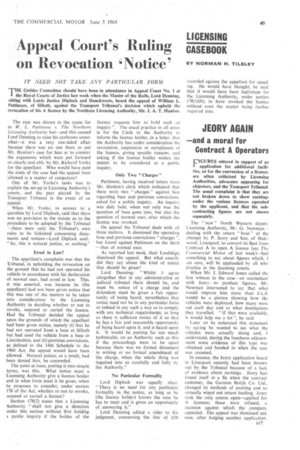Appeal Court's Ruhng - CASEBOOK
Page 51

If you've noticed an error in this article please click here to report it so we can fix it.
on Revocation 'Notice'
IT NEED NOT TAKE ANY PARTICULAR FORM THE Geddes Committee should have been in attendance in Appeal Court No. 1 at I the Royal Courts of Justice last week when the Master of the Rolls, Lord Denning. sitting with Lords Justice Diplock and Danckwerts, heard the appeal of William L. Pattinson, of SiRoth, against the Transport Tribunal's decision which upheld the revocation of his A licence by the Northern Licensing Authority, Mr. J. A. T. Hanlon.
The case was shown in the cause list as W.L. Pattinson v. The Northern Licensing Authority but—and this caused Lord Denning to raise his eyebrows somewhat—it was a very one-sided affair because there was no one there _to put Mr. Hanlon's case for him or to counter the arguments which were put forward so clearly and ably by Mr. Richard Yorke for the appellant. Who would have paid the costs of the case had the appeal been allowed is a matter of conjecture!
One of Mr. Yorke's tasks was to explain the set-up in Licensing Authority's courts, and the part played by the Transport Tribunal in the event of an appeal
When Mr. Yorke, in answer to a question -by Lord Diplack, said that there was no provision in the statute as to the procedure to be adopted by the Tribunal 1—there were only the Tribunal's own rules to be followed concerning documents and notices—Lord Diplock said: "So, this is natural justice, or nothing."
Erred in Law?
The appellant's complaint was that the Tribunal, in upholding the revocation on the ground that he had not operated his vehicle in accordance with his declaration of normal user, had erred in law. This, it was asserted, was because he (the appellant) had not been given notice that this was one of the matters to be taken into consideration by the Licensing Authority in deciding whether or not to revoke, suspend or curtail the licence. Had the Tribunal decided the appeal upon the grounds of which the appellant had been given notice, namely (i) that he had not operated from a base at Silloth but had 'used the vehicle from a base in Lincolnshire, and (ii) previous convictions, as defined in the 14th Schedule to the 1960 Act, the appeal would have been allowed. Natural justice, as a result, had been denied him, he contended. •
The point at issue, putting it into simple terms, was this. What -notice must a Licensing Authority give a licence holder and in what form must it be given, when he proposes to consider, under section 178 of the Act, whether or not to revoke, suspend or curtail a licence'?
Section 178(2) states that a Licensing Authority " shall not give a direction under this section without first holding a public inquiry if the holder of the licence requests him to hold such an inquiry ". The usual practice in all areas is for the Clerk to the Authority to inform the licence holder, in a letter, that the Authority has under consideration the revocation, suspension or curtailment of the licence, giving specific reasons, and asking if the licence holder wishes the matter to be considered at a public inquiry.
Only Two " Charges " Pattinson, having received letters from Mr. Hanlon's clerk which indicated that there were two " charges" against him regarding base and previous convictions. asked for a public inquiry. An inquiry was duly held, when not only was the question of base gone into, but also the question of normal user, after which the licence was revoked.
On appeal the Tribunal dealt with all three matters. It dismissed the operating base and previous convictions "charges ", but found against Pattinson on the third —that of normal user.
' As reported last week, their Lordships dismissed the appeal. But what exactly did they say about the kind of notice that should be given?
Lord Denning: "Whilst 1 agree altogether that in any administrative or judicial tribunal there should be, and must be, notice of a charge and the defendant mtist be given a -fair opportunity of being heard, nevertheless that notice need not be in any particular form or indeed in any such a way as to comply with any technical requirements; as long as there is sufficient notice of it so that he has a fair and reasonable opportunity of being heard upon it, and is heard upon it. It would be putting far too much technicality on an Authority such as this if the proceedings were to be upset because there was no formal document in writing or no formal amendment of the charge, when the whole thing was inquired into so carefully and fully by the Authority."
No Particular Formality Lord Diplock was equally clear. "There is no need for any particular formality in the _notice, as long as he (the licence holder) knows the case he has to meet and is given an opportunity of answering it."
Lard Denning added a rider to his judgment, concerning the fine of £50 recorded against the appellant for speeding. He would have thought, he said, that it would have been legitimate for the Licensing Authority, under section 178(1)(b), to have revoked the licence without even the matter being further inquired into.












































































































































































